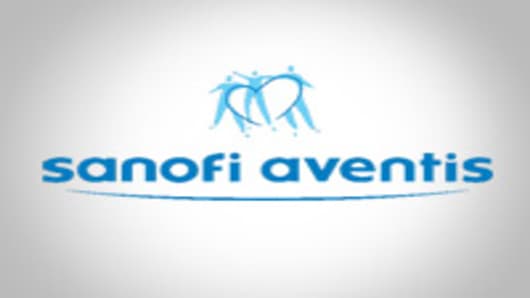Shares of Sanofi-Aventis are getting a little investor injection on the back of the emergency release of the Lantus diabetic insulin studieslate last Friday.
The stock had fallen about 10 percent late last week on rumors that reports were about to be published in a medical journal identifying a suspected higher risk of cancer with Lantus, the world's top-selling insulin.
Most analysts think the data are inconclusive, that a cause and effect has not been established, but that Lantus sales could, nonetheless, still suffer.
For those who might be unfamiliar with part of the the formal protocol surrounding the publication of studies in medical journals, here's what usually is supposed to happen on our end. Reporters receive a heads up and sign up to receive the embargoed studies. That gives them time to do research and interviews, so their stories can hit the wires, the web or the air as soon as the embargo lifts. If you happen to break an embargo, you lose the privilege. In this instance, the embargoed Lantus studies had not yet reached the news media, at least not directly from the medical journal itself. They definitely had not reached us.
That's because they weren't supposed to come out until a week from today. This morning I talked over the phone with Professor Edwin Gale, the editor of "Diabetologia" (don't make me pronounce it) or the "Journal of the European Diabetes Association," which published the studies, to try to find out how and why the data leaked a week-and-a-half early. He told me that the publication had the best of intentions. It didn't want medicine and the market to be blindsided like it had been by the controversial study of GlaxoSmithKline's diabetes pill Avandia a couple of years ago, so it brought several European regulatory agencies into the loop awhile ago. And, in hindsight, Professor Gale thinks that might have been a mistake. He would not speculate on the record where the leak could have come from and he thinks it'd be impossible to find the source. But he did say, "We regretted that we informed the regulatory authorities as fully and as early as we had. We would inform them, but we would give them less of a lead time on it."
When SNY shares started tanking last Thursday, the journal regrouped. Professor Gale told me, "Suddenly stories were flying around that there were papers coming out and the stock exchange was going into freefall and we assumed that someone had leaked our data." So, it took the rare step of putting the studies on line way early. "Diabetologia" didn't even have a press release written yet. In fact, the original set of documents that were posted late last Friday still said "Author's Proof!" at the top of them. They've since been updated.
Professor Gale estimated that fewer than 30 people, to his knowledge, had seen the studies by the beginning of this month. But clearly by late last week, many others had seen or, at least, heard about them. "Since many people had seen our data we felt a panic was being created and if that was the case the most responsible thing to do was put out what we've got, so there were facts instead of rumors," Gale said. "We just shoved out what we had because we thought it was time."
In my blog last Friday, I said I'd be shocked if a medical journal moved up its release date. Oops. But I wondered whether Sanofi might push for early publication. Gale told me, "We were not influenced in any way by Sanofi."
Questions? Comments? Pharma@cnbc.com and follow me on Twitter at mhuckman


